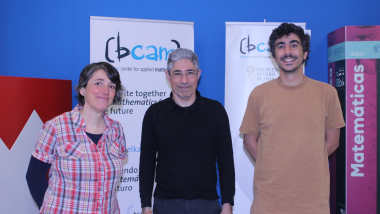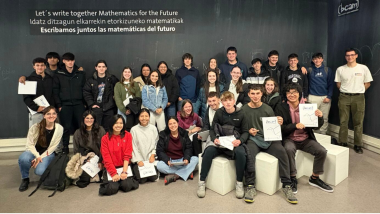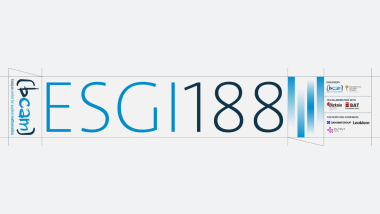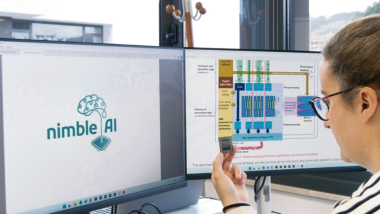BCAM hosts the world's leading experts in residual minimisation methods for the sixth edition of the MINRES conference
The Basque Center for Applied Mathematics, promoted by the Department of Education of the Basque Government; part of the BERC network; and awarded the Severo Ochoa Centre of Excellence accreditation on three consecutive occasions, the latest in the 2021 call, has hosted the sixth edition of the Residual Minimisation Methods Conference and welcomed the world's leading experts in the field to the city.
This biennial event aims to bring together prominent international researchers in the area of residual minimisation methods (MINRES), including the Discontinuous Petrov-Galerkin method and Least Squares Finite Elements.
The MINRES method is a powerful tool in the field of numerical computation for efficiently and accurately solving systems of non-symmetric and non-positive definite linear equations.
The series of conferences began in Austin (USA) in 2013, followed by the second edition in Delft (Netherlands) in 2015, the third in Portland (USA) in 2017, the fourth in Berlin (Germany) in 2019, and the fifth in Santiago (Chile) in 2022. Now, in its sixth instalment, the academic community has gathered in Bilbao thanks to the local organisation by the Mathematical Design, Modelling and Simulations - MATHDES group of BCAM, co-led by Prof. David Pardo and postdoctoral researchers Judit Muñoz and Carlos Uriarte.
Over four days, specialists have shared their most recent research, debated the progress in the implementation of these methods, and established alliances for future projects. The congress has served as a platform to drive growth and innovation in the field of waste minimisation, with the ultimate aim of addressing present and future challenges in this vital area of scientific research and applied engineering.
Additionally, a special issue featuring contributions related to the workshop will be published in the leading journal in the field, Computer and Mathematics with Applications. The guest editor-in-chief will be Fleurianne Bertrand (University of Twente), with guest editors Judit Muñoz (BCAM) and Thomas Führer (Pontificia Universidad Católica de Chile), all three participants of the workshop "Minres & LS 2024 Bilbao".
PARTICIPANTS
This conference not only represents a unique opportunity for collaboration and knowledge exchange among some of the leading experts in MINRES but also serves as a space for generating new ideas and approaches to further advance the field.
In total, 50 speakers at various stages of their research careers have participated in this conference. Among these, the organisation highlights the following profiles:
- Pavel Bochev, Sandia National Laboratories, New Mexico, USA
Bochev is a senior scientist at Sandia National Laboratories in Albuquerque, where he works at the Centre for Computational Research. Pavel's research interests include compatible discretisations for partial differential equations, meshless methods, optimisation and control problems, and the development of new heterogeneous numerical methods that preserve properties for complex applications relevant to the mission of the US Department of Energy and the National Nuclear Security Administration.
- Zhiqiang Cai, Purdue University, Indiana, USA
Zhiqiang Cai is a renowned mathematician with a solid academic background and extensive professional experience. He has made significant contributions to the field of mathematics through his roles as Associate Professor at Purdue University, Consultant at the Rocketdyne Division, Boeing North American, and various visiting and assistant professor positions at institutions such as the University of Southern California, New York University, and Brookhaven National Laboratory.
- Victor M. Calo, Curtin University, Perth, Australia
Dr. Víctor Manuel Calo is a professor in the Department of Applied Geology at the Western Australian School of Mines within the Faculty of Science and Engineering at Curtin University. Dr. Calo holds the CSIRO Chair in Computational Geoscience and is a highly cited researcher actively involved in knowledge dissemination. He holds two patents and is the author of more than 170 peer-reviewed publications.
- Carsten Carstensen, Humboldt University of Berlin, Germany
Carstensen is a prominent figure in the field of numerical analysis and computational sciences, with a distinguished career spanning several prestigious institutions. He has been a Professor (C4) of Numerical Analysis at Humboldt University of Berlin since December 2003, and has made significant contributions to academia and research.
- Wolfgang Dahmen, University of South Carolina, USA
Distinguished for his foundational contributions to Constructive Approximation Theory, particularly in the development of Multivariate Splines and their applications to Computer-Aided Geometric Design. These works were primarily carried out at Bielefeld University (1981-1987) and Free University of Berlin (1987-1992).
- Leszek Demkowicz, Oden Institute for Computational Engineering and Sciences, Texas, USA
Associate Director of the Institute for Computational Engineering and Sciences (ICES) and holder of the W. A. "Tex" Moncrief, Jr. Chair in Computational Engineering and Sciences II. He is a professor in the Department of Aerospace Engineering and Engineering Mechanics and the Department of Mathematics at the University of Texas at Austin.
- Jay Gopalakrishnan, Portland State University, Oregon, USA
Renowned mathematician in numerical analysis and partial differential equations. He has contributed to areas such as spectral approximation theory. He is a professor at Portland State University.
- Rob Stevenson, University of Amsterdam, Netherlands
Dutch mathematician specialising in numerical analysis of partial differential equations. He works on multigrid and adaptive methods.
This workshop has been partially funded by the European Union's Horizon 2020 research and innovation programme under the Marie Sklodowska-Curie action (Ref. 101017984 (GEODPG)), the Ministry of Science, Innovation and Universities through the State Research Agency and by the European Union NextGenerationEU/PRTR with the project reference TED2021-132783B-I00, and by the "Severo Ochoa" Excellence accreditation (Ref. CEX2021-001142-S), by the Basque Government through the BERC2022-2025 project and the Ikerbilerak 2024 grants, and by the Bilbao City Council through the “BILBOMATH 2024” project.

Related news
About the center
About the center




